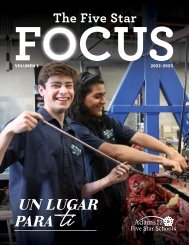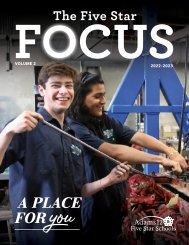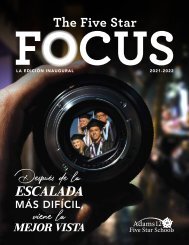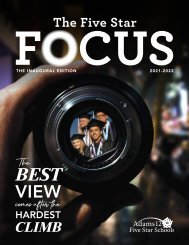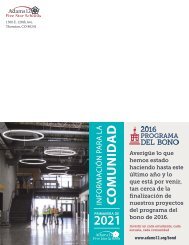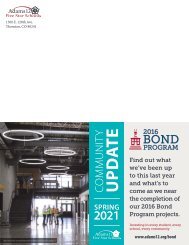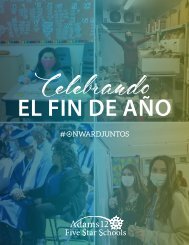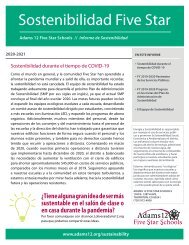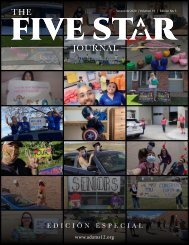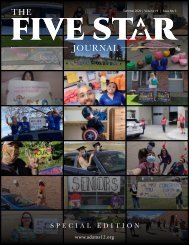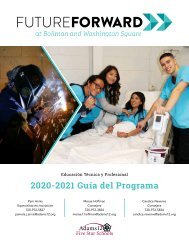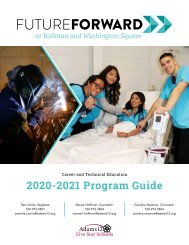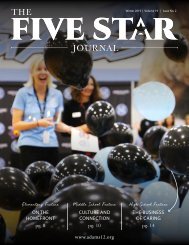Sustainability Report 2020-2021
- No tags were found...
You also want an ePaper? Increase the reach of your titles
YUMPU automatically turns print PDFs into web optimized ePapers that Google loves.
Five Star Sustainable<br />
Adams 12 Five Star Schools // <strong>Sustainability</strong> <strong>Report</strong><br />
<strong>2020</strong>-<strong>2021</strong> IN THIS REPORT<br />
<strong>Sustainability</strong> in the time of COVID-19<br />
As the world at large, and Five Star community learn to cope with and pivot<br />
from the global pandemic, it’s important to remember – sustainability<br />
isn’t canceled. The sustainability team has been hard at work to develop the<br />
next <strong>Sustainability</strong> Management Plan (SMP), as the current SMP wrapped<br />
up at the end of the <strong>2020</strong> school year. Future goals might include expanding<br />
school-based green teams to every school, developing a student-led<br />
sustainability advisory council, converting more schools to LED lighting,<br />
and expanding cafeteria composting programs. Additionally, many staff<br />
from custodial and maintenance operations, to school staff and district<br />
leadership have worked to ensure our buildings are operating in a safe<br />
manner when staff and students are present, and are also not being<br />
wasteful when we’ve had to go to remote operations. Beginning in March<br />
<strong>2020</strong> when our first remote operations have been implemented through<br />
December <strong>2020</strong>, the district has balanced increased ventilation needs<br />
with building shutdowns to save roughly $45,000 in utility costs compared<br />
to those same months in 2019. We will continue to support our schools<br />
and community through this turbulent time, and are excited to look<br />
forward to future sustainability and resilient operations.<br />
Have any great ideas for being<br />
more sustainable in the classroom<br />
or at home during the pandemic?<br />
Please reach out to shannon.t.oliver@adams12.org so<br />
we can share those ideas.<br />
• <strong>Sustainability</strong> in the time of<br />
COVID-19<br />
• FY 2019-<strong>2020</strong> Utilities<br />
Benchmark<br />
• FY 2019-<strong>2020</strong> <strong>Sustainability</strong><br />
Management Plan Goals<br />
Progress<br />
• The <strong>Sustainability</strong> Team<br />
Energy and <strong>Sustainability</strong> is responsible<br />
for managing utility use and for<br />
promoting social, economic and<br />
environmental sustainability for the<br />
district. Efforts include installing more<br />
energy efficient equipment, managing<br />
our water consumption, tracking our<br />
bus fleet fuel use and engaging our<br />
students to be better stewards of the<br />
environment.<br />
We’re taking steps to “go green.”<br />
That means our schools and district<br />
departments are working to be wise<br />
stewards of our resources. Learn how<br />
we are being sustainably smart – and<br />
how you can do your part.<br />
ADAMS 12 FIVE STAR SCHOOLS<br />
1500 E. 128TH AVE,<br />
THORNTON, CO 80241<br />
(720) 972-4000<br />
www.adams12.org/sustainability
Fiscal Year 2019-<strong>2020</strong> Utilities & <strong>Sustainability</strong> Benchmark<br />
The process of benchmarking involves establishing a baseline for something you are interested in<br />
tracking over time and then comparing recent performance to that historic baseline. For the utilities<br />
and sustainability metrics established by the district, a three-year baseline was set for Fiscal Years (FY)<br />
2014-2016. We are then able to compare our performance for each following fiscal year to that baseline<br />
period. A few exceptions to this exist:<br />
- Total water use is compared on a calendar year basis, due to the watering season falling within<br />
fiscal years during the months of May-September. So while the baseline is still the three-year<br />
average, the current benchmark is for the 2019 calendar year.<br />
- No historic data was available for student engagement or waste diversion rate during the<br />
three-year baseline period, so those baselines are a one-year period of FY 2016-2017. The<br />
current benchmark is the same as the other metrics, FY 2019-<strong>2020</strong>.<br />
Below is the FY 2019-<strong>2020</strong> benchmark data (2019 for total water use) on how the district performed,<br />
as well as the utilities cost benchmark for the same periods.<br />
FY 2019-<strong>2020</strong> UTILITIES PERFORMANCE BENCHMARK<br />
Parameter Period Performance % Change<br />
Electricity Use 3-Year Baseline 39,285,325<br />
(kWh/yr) FY 2019-<strong>2020</strong> 38,322,518<br />
Natural Gas Use 3-Year Baseline 1,640,935<br />
(therm/yr) FY 2019-<strong>2020</strong> 1,699,727<br />
-2.51%<br />
3.46%<br />
FY 2019-<strong>2020</strong><br />
UTILITIES COST<br />
BENCHMARK<br />
$5M<br />
-10.8%<br />
Energy Use Intensity 3-Year Baseline 66.1<br />
(kBtu/sq. ft.) 1 FY 2019-<strong>2020</strong> 66.3<br />
Renewable Energy 3-Year Baseline 5.7%<br />
Offset (%) FY 2019-<strong>2020</strong> 7.3%<br />
0.27%<br />
28.07%<br />
$4M<br />
Bus Fleet Fuel Efficiency 3-Year Baseline 5.4<br />
(gal/VMT) FY 2019-<strong>2020</strong> 6.2<br />
11.69%<br />
$3M<br />
Indoor Water Use 2 3-Year Baseline 53,874.1<br />
(kGal/yr) 2019 44,038.3<br />
Total Water Use 2 3-Year Baseline 187,714<br />
(kGal/yr) 2019 153,443<br />
Student Engagement FY 2016-2017 29<br />
(# Green Teams) FY 2019-<strong>2020</strong> 25<br />
-22.33%<br />
-22.33%<br />
-16.00%<br />
$2M<br />
$1M<br />
-5.1%<br />
-13.3%<br />
Waste Diversion Rate FY 2016-2017 16.9%<br />
(%) FY 2019-<strong>2020</strong> 17.2%<br />
1.46%<br />
1 Energy Use Intensity (EUI) is a method for comparing different building types by standardizing<br />
their total energy use by square feet of building space and weather normallizing that<br />
information. A lower EUI is a more efficient building.<br />
2 Total Water Use Benchmark based on calednar year due to watering season.<br />
WATER<br />
COST<br />
NATURAL<br />
GAS COST<br />
ELECTRICITY<br />
COST<br />
2019<br />
3-YEAR BASELINE<br />
Five Star Sustainable <strong>2020</strong>-<strong>2021</strong> // page 2
Fiscal Year 2019-<strong>2020</strong> <strong>Sustainability</strong> Management Plan Goals Progress<br />
During the 2016-2017 Fiscal Year, a <strong>Sustainability</strong> Planning Committee was convened to produce<br />
the first sustainability plan for Adams 12 Five Star Schools. The outcome of this undertaking, the<br />
sustainability management plan (SMP), has guided the Five Star District’s development and integration<br />
of sustainable practices into the district’s culture through fiscal year <strong>2020</strong>. Throughout each year,<br />
several goals are being pursued that will help the district have a smaller environmental footprint in<br />
our communities while also fostering greater engagement on sustainability topics from our students<br />
and staff. The beginning of each school year will be an opportunity to look back on the prior year and<br />
see how well we progressed toward those goals. Below is a table capturing our sustainability efforts<br />
through June <strong>2020</strong>.<br />
There were also two goals set for the past fiscal year for which we were not able to make any progress.<br />
These were identified as being either infeasible with current resources, of low priority based on cost/<br />
benefit analysis, or simply too complex to address in one fiscal year. While these goals remain as<br />
desired targets for the district, additional personnel and/or resources will be needed for success on<br />
these items.<br />
% COMPLETE<br />
100%<br />
GOAL<br />
Electricity: Develop electricity challenge open to all schools, to occur once per school year beginning with the<br />
2017-2018 school year through the 2019-<strong>2020</strong> school year.<br />
MET OR<br />
EXCEEDED<br />
GOAL<br />
100%<br />
100%<br />
Engagement: Survey all schools once per year regarding green teams/environmental clubs from 2017 through <strong>2020</strong>.<br />
Transportation: Retire and replace three diesel buses with propane buses per year beginning fiscal year 2018<br />
through fiscal year <strong>2020</strong>.<br />
100%<br />
Water: Convert two athletic fields or playfields per year from bluegrass to artificial turf, beginning June 2018 and<br />
continuing through June <strong>2020</strong>.<br />
89%<br />
Water: Reduce districtwide water use by 25 percent from July 2013-June 2016 baseline by end of October <strong>2020</strong>.<br />
43%<br />
Waste Management: Increase districtwide waste diversion rate to 40 percent by June <strong>2020</strong>.<br />
41%<br />
Energy Use Intensity: Reduce building specific Energy Use Intensity (EUI) from July 2013-June 2016 baseline by June<br />
<strong>2020</strong> for Elementary schools by 15 percent.<br />
IMPROVED,<br />
BUT STILL<br />
HAVE WORK<br />
TO DO<br />
40%<br />
34%<br />
Engagement: Get at least ten schools to host a zero-waste lunch once per school year beginning fall 2017 and continuing<br />
through spring <strong>2020</strong>.<br />
Energy Use Intensity: Reduce building specific Energy Use Intensity (EUI) from July 2013-June 2016 baseline by June<br />
<strong>2020</strong> for Middle schools by 10 percent.<br />
29%<br />
Renewable Energy: Offset 25 percent of districtwide electricity use (kWh/yr) with renewable energy by June <strong>2020</strong>.<br />
17%<br />
Electricity: Reduce district-wide electricity usage (kWh/yr) by 15 percent from the July 2013-July 2016 baseline by<br />
June <strong>2020</strong>.<br />
15%<br />
Energy Use Intensity: Reduce building specific Energy Use Intensity (EUI) from July 2013-June 2016 baseline by June<br />
<strong>2020</strong> for Alternative schools and Support Facilities by 15 percent.<br />
DIDN’T<br />
MEET<br />
GOAL<br />
0%<br />
0%<br />
Energy Use Intensity: Reduce building specific Energy Use Intensity (EUI) from July 2013-June 2016 baseline by<br />
June <strong>2020</strong> for High schools by 10 percent.<br />
Engagement: Create sustainability report cards on a school-by-school basis to include electricity use, natural gas use,<br />
water use, waste diversion and green team metrics. <strong>Report</strong> cards will be released early each school year, covering data<br />
for the previous school year, beginning with the 2017-2018 school year through the 2019-<strong>2020</strong> school year.<br />
Five Star Sustainable <strong>2020</strong>-<strong>2021</strong> // page 3
The <strong>Sustainability</strong> Team<br />
Chris Wilderman<br />
Maintenance and Operations Director<br />
Chris worked previously for Adams 12 Five Star Schools as the Security Manager before moving to<br />
Boulder Valley School District for five years as the Director of Operations, Security and Environmental<br />
Services. Eager to return to Five Star Schools, Chris took on the role of Maintenance and Operations<br />
Director in July 2017. He leads the sustainability team, facilities/maintenance, custodial operations,<br />
community use, and environmental health.<br />
Shannon Oliver<br />
Manager of Energy and <strong>Sustainability</strong><br />
Shannon began with Five Star Schools in February 2016, with a passion for minimizing the impact we<br />
all have on our surrounding environment and protecting our health from the potential negative<br />
impacts of a contaminated environment. He has a Bachelor of Science in Environmental Health from<br />
Colorado State University and a Master in Public Health—Global Environmental Health from Emory<br />
University. Shannon is excited to work with district students and personnel to achieve meaningful<br />
reductions in energy and water use, and help improve waste reduction efforts.<br />
Ed Jolly<br />
Energy Engineer<br />
Ed began with Five Star Schools in July 2018 and entered the energy management and building<br />
operations industry in 2002. He has a Bachelor of Science in Mathematics from Metropolitan State<br />
University in Denver. Ed is excited to apply is knowledge and expertise to district operations for<br />
energy and cost savings.<br />
Bret Lynch<br />
Water Resource Specialist<br />
Bret has been on the Grounds team for Five Star Schools since 2016, has two degrees in horticulture<br />
and business, and has been in the landscape industry for 25 years. He is excited to jump in and use<br />
his knowledge of botany and integrated pest management to continue making our landscapes more<br />
sustainable. The Water Resource Specialist role will continue as the point contact for irrigation<br />
programming, and will work with the irrigation techs and grounds team on repairs and other<br />
landscape maintenance projects to reduce the largest use are for our water resources. Welcome to<br />
the team Bret!<br />
Five Star Sustainable <strong>2020</strong>-<strong>2021</strong> // page 4



